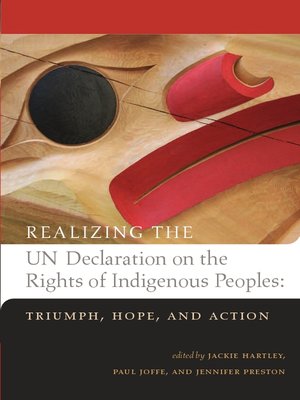Realizing the United Nations Declaration on the Rights of Indigenous Peoples
ebook ∣ Triumph, Hope, and Action
By Jackie Hartley

Sign up to save your library
With an OverDrive account, you can save your favorite libraries for at-a-glance information about availability. Find out more about OverDrive accounts.
Find this title in Libby, the library reading app by OverDrive.



Search for a digital library with this title
Title found at these libraries:
| Library Name | Distance |
|---|---|
| Loading... |
Adopted by the UN General Assembly on 13 September 2007, the United Nations Declaration on the Rights of Indigenous Peoples affirms the "minimum standards for the survival, dignity and well-being of the indigenous peoples of the world." The Declaration responds to past and ongoing injustices suffered by Indigenous peoples worldwide. It provides a strong foundation for improved relationships with states, and for the full recognition of the inherent rights of Indigenous peoples. Despite this, Canada is one of the few countries to oppose the Declaration.
"The Declaration is a visionary step towards addressing the human rights of indigenous peoples" proclaimed United Nations Secretary-General Ban Ki-moon. "[I]t provides a momentous opportunity for States and indigenous peoples to ... promote reconciliation and ensure that the past is not repeated."
The contributors to this collection analyze the development of the Declaration, recall the triumph of its adoption, and illustrate the hopes and actions for its implementation. The discussion moves beyond Canadian borders to the international stage, providing accessible information and guidance on the Declaration and how it can be used to advance human rights. Policy makers, Indigenous communities, politicians, academics, lawyers, human rights advocates, NGOs, and anyone interested in the significance of the Declaration will find this to be a valuable resource.
Contributors include Indigenous leaders, legal scholars and practitioners, state representatives, and representatives from NGOs, with extensive knowledge of and experience in Indigenous peoples' human rights law, policy, and practice. Biographies of the contributors can be found on our web site.







